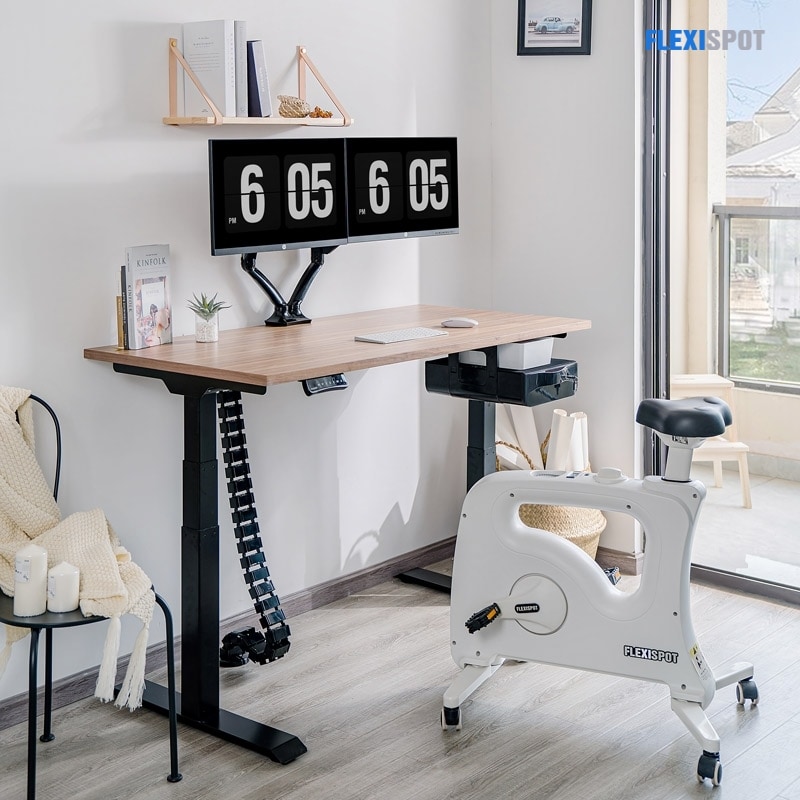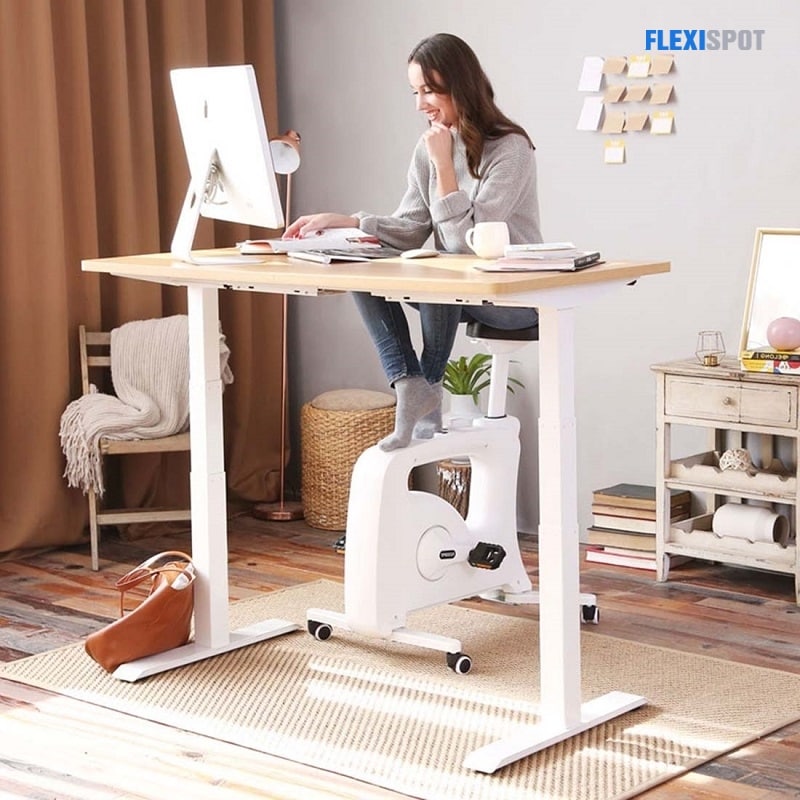In the modern workforce, a lot of people see their job as just another way to make money. It's unfortunate that many don't enjoy what they do- but if you're one of those rare few who love your work, then count yourself lucky because it can be incredibly rewarding and fulfilling! This doesn't change how mentally taxing most jobs are though; with long hours and tough deadlines being an almost inevitable part of any profession these days.
It's essential to have a good sense of humour in the office because sometimes you need it to make it through your 8-hour shift. You've got that coworker who doesn't know when enough is enough and those long hours where time for socializing with friends starts dwindling till you have no social life. But one thing stands out among all others: sitting at your desk for an extended period of time can be downright exhausting!
Why is that so? Well, sitting in a chair all day is the worst thing you can do for your health. It puts so much stress on your body and causes pain, especially when sitting hunched over in an uncomfortable desk position or with arms constantly scrolling on the computer. Medical experts call this RSI - Repetitive Strain Injury.
The number of people who are afflicted with repetitive strain injuries is currently at an all-time high. We wouldn't want to alarm you, but most people don't realize the havoc that RSI can wreck on their lives until it's too late. The good news is you can counter the effects of RSI by performing a few easy stretches while working in your office cubicle or sitting on public transportation.
Follow along, and we promise that you'll enjoy a more productive and healthy workday.
Desk Stretches for Your Neck
Your shoulders could be doing more work than they need to carry all the weight of your head. You probably get little to no break from the cycle of bending down at your desk to staring up at the computer screen. However, it's important not only that you take a deep breath but also to make sure you're taking care of those neck muscles- they weren't designed to bend in one direction forever! Resting them on your arms or against something sturdy can help relieve some tension (although this is not advisable).
Consider performing the following stretches to alleviate the strain:
Basic Neck Stretches
Positioning
First, ensure that you're comfortably seated in your office chair with your feet planted firmly on the ground. Then, straighten your back as you drop your arms to the side of your hips. Now you're ready to go.
Routine
- Take a soothing deep breath as you lean your head forward
- Turn your head to the left
- Pause for at least 10 seconds
- Look forward as you straighten your chin
- Turn your head to the right
- Repeat the routine 3 times for each direction or until you feel some relief
Enhanced Upper Neck Stretches
Positioning
Assume the exact relaxed positioning as you would for the basic neck stretches.
Routine
- Place your right hand over your head
- Ensure the tips of your fingers touch your left ear
- Gently pull your head towards your right shoulder until you feel a light stretch
- Hold the pose for at least 15 seconds
- Place your left hand over your head
- Ensure the tips of your fingers touch your right ear
- Repeat these steps on each side until you feel some relief
Neck rotator stretches
Positioning
Rest easy on your office chair with a straightened back. If you chose to rest your back on the backrest, please ensure your head is off the headrest.
Routine
- Keep your chin straight
- Look to the right
- Ensure that your head moves past the right shoulder
- Look to the left
- Ensure that your head moves past the left shoulder
- Repeat these steps until you work out all the kinks from your shoulder and neck muscles
- You can also nod your head to work out more muscle groups
Desk Stretches for Your Shoulders
The shoulders also carry a lot of weight on their own. This is especially true if you don’t make proper use of the armrests on your office chair. You can inadvertently hurt your shoulder if you slouch too much.
The following desk stretches should help you iron out all the kinks in your shoulders:
The Basic Shoulder Shrug
Positioning
Ensure your bum is firmly resting on your seat. Move your arms away from the armrest, and ensure that your back isn't resting on the backrest.
Routine
- Raise your left and right shoulders at the same time
- Get your shoulders as close as possible to your ears
- And, drop your shoulders with as much force as possible
- Repeat these steps 10 times
- You can also swing and rotate your shoulders to maximize your pain relief
Combined Neck and shoulder stretches
Positioning
Assume a seated position.
Routine
- Keep your head squarely over your shoulders with good posture as if someone was drawing an outline around it in chalk.
- Slowly turn to the right until you feel a stretch in the left side of your neck and shoulder.
- Hold for 15-30 seconds before returning to starting position (straight up).
- Repeat on opposite arm/side - so keep forehead straight ahead, but rotate all at once to the counterclockwise direction.
- Going both ways twice a piece periodically throughout the day should be enough!
Shoulder extensor stretches
Positioning
Stand up straight with your arms behind your back as you interlock your fingers. Spread your feet slightly for some stability.
Routine
- Lift your arms high as possible without breaking the contact between your hands
- Hold the position
- Rock your arms a little to ease out all that tension
- Repeat these steps until you feel some relief on your chest and shoulder area
Desk Stretches for Your Arms
You probably engage your arm in more movement than any other part of your body while seated behind your desk. Ultimately, they'll get tired at some point. Here are a few routines to work out the stress and pain.
Basic Triceps Stretches
Positioning
Stand with the feet shoulder-width apart and back straight; these will help keep balance.
Routine
- Bring both of your elbows up, then grab the elbow on one side in the opposite hand (left: right; or vice versa).
- Pull that arm towards your head as if you were assuming a chokehold position.
- Hold this position for 15 seconds max before switching arms
Overhead Arm Stretches
Positioning
Rest your feet firmly on the ground with your back off the backrest. Raise both of your arms towards the ceiling.
Routine
- Reach as far as possible to the right side
- Then to the left
- Hold the pose each time as you feel some relief
- Alternate sides and repeat the routine
Standing Desk Stretches
Getting off your ergonomic office chair enhances your blood circulation, which improves focus. However, getting up every 30 minutes might be disruptive and affect your productivity. Fortunately, you get the best of both worlds with Flexispot's Adjustable Standing Desk Pro Series.
This sit and stand desk not only allows you to continue working while standing. But it also gives you plenty of room to perform the following stretches:
Standing Hamstrings Stretches
Positioning
Stand with your back straight and feet shoulder-width apart.
Routine
- Place one heel on a slightly raised surface, bend the knee to bring the thigh towards your chest while keeping the spine as straight as possible.
- Hold this stretch for 10 to 30 seconds- this is good enough time to feel those tight muscles loosen up after all of that hard work you've been putting forth throughout the day.
- Repeat the steps on the opposite side.
Standing Back Extension Stretches “One Stretch”
This stretch routine targets most muscle groups on your back, hips, glutes, and lower extremities. It's also clinically proven to reduce stress and pain. And, best of all, you won't work up too much of a sweat.
Positioning
Stand straight while keeping your feet shoulder-width apart. Rest your hands behind your back for support. Ensure that your fingers point downwards as you pay attention to your breathing.
Routine
- Inhale for 3 seconds
- Look up as you bend backward while keeping your knees straight
- Stand up straight
- Repeat the routine 3-5 times
Desk Stretches for Your Hands
Carpal tunnel syndrome is one of the most common repetitive strain injuries. It results from the tension sustained while using your hands to write, draw, or when operating a mouse for too long. That's why it's also referred to as mouse or keyboard hand.
The major problem is that this condition gradually deteriorates your wrist muscle. So, most people don't see it coming until it's too late. Fortunately, you can avert the degrading effects of carpal tunnel with the following stretches.
Tennis Ball Squeeze
Holding a tennis ball in your hand, squeeze it tightly until you feel the muscles in your wrist start to work. Hold for 5-10 seconds and then release. Repeat several times during the day whenever possible.
The shakes
This routine is as simple as it sounds. All you have to do is imagine you've just washed your hands and are trying to shake them dry.
Positioning
Stretch out your arms, then bend them downwards from the elbow. You can do this while seated if you’re working on your standing desk.
Routine
- Shake your hands as aggressively as possible
- Maintain this motion for 1 to 2 minutes
Desk Stretches for Your Back
Your spine supports a lot of weight even when you sit for hours a day. That's why bad posture affects the back muscles and tendons more than any other region in your body. This tension causes slouching and has adverse effects on your working style. The result is usually a visit to a spa or a chiropractor in adverse circumstances.
The following exercises can help you alleviate stress and pain. They can also ensure that you don't burn out while at work.
Trunk Rotation Stretches
Trunk rotation stretches allow you to work out all the kinks in your torso. Aside from targeting most of your upper body muscles, it also helps improve blood circulation and concentration levels. The beauty of this stretch routine is that it's so inconspicuous that your workmates won't get distracted as you work out.
Office Chair Torso Stretches
This is a simple and discreet office stretch. The beauty here is that it works out the kinks in your shoulders, chest, and back with low-calorie expenditure. These stretches not only relieve pain and stress, but they reduce tension around your optic nerve to help improve your eyesight.
Positioning
Rest your back on your office chair. Wrap your arms around the back of the office chairs. Interlock the fingers of your right hand with those on the left hand.
Routine
- Arch your back by pulling in your belly
- Move your chest as far forward as possible
- Hold the pose for up to 30 seconds
- Repeat the routine 4 times or until you feel some relief
Easy Trunk Rotation Stretch
If you're feeling a little stiff and not so flexible, try this standing stretch at the office.
Positioning
Begin in an upright position facing any wall with your arm extended to one side. Resting on that hand is fine as long as it's positioned comfortably over the surface of said wall.
Routine
- Slowly rotate away from your arm until you feel a good stretch in the front part of your chest area. You should only move within pain-free range but don't be afraid if there's some discomfort or light pressure because those are common sensations when stretching muscles out for the first time after being sedentary for too long.
- Hold that pose anywhere between 10 seconds to 1 minute before rotating back towards the centre; repeat three times.
Are You Sitting Down for Too Long?
Scientific studies show that performing office desk stretches can have a transformative effect on your health and productivity. Office workers are often prone to pain and fatigue after sitting for hours on end. But stretching while seated can be a great way to relieve some of the stiffness; take advantage of what we call "desk stretches." You'll feel much more energized by taking this small break now and then.





